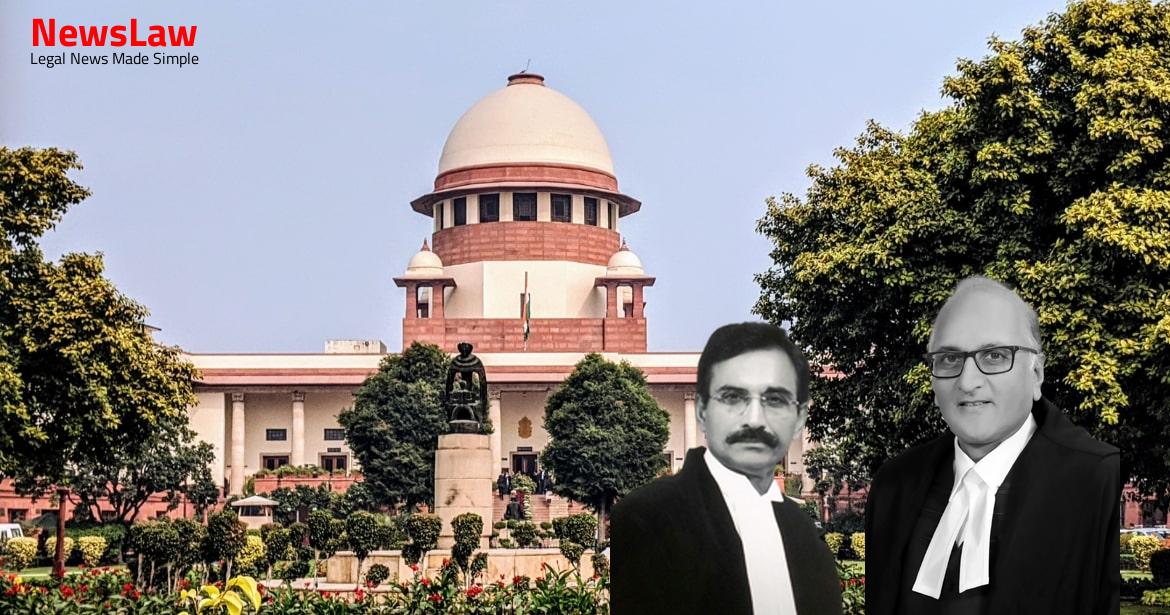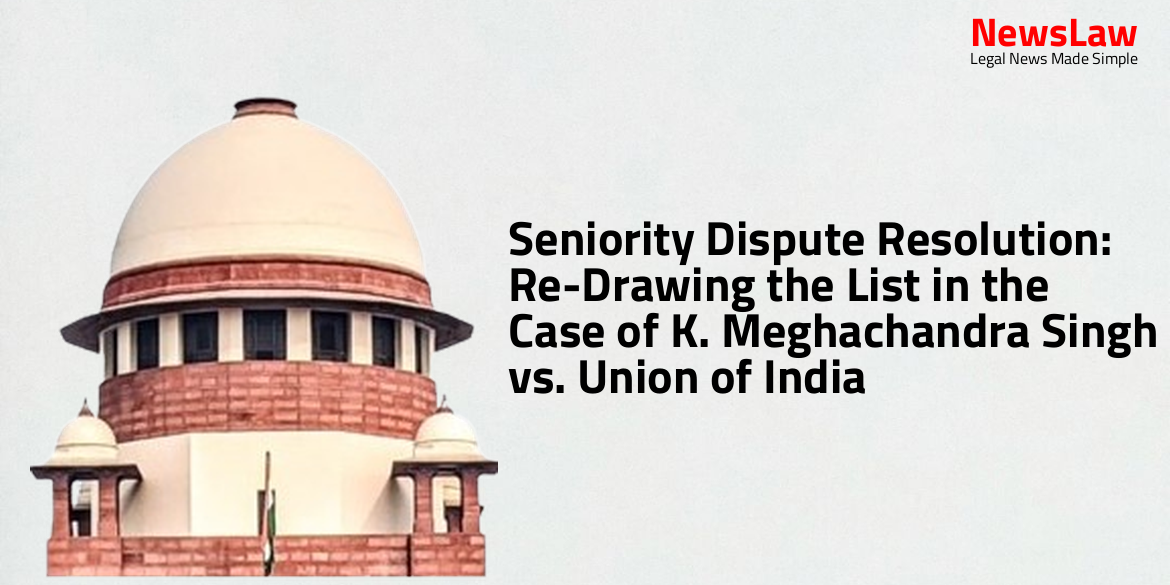Explore the fascinating world of legal interpretation of financial transactions in the context of land leases. Discover how terms like debt, borrow, and financial indebtedness are meticulously analyzed and defined by the court. Gain insights into the statutory interpretation used to unravel complex financial arrangements in lease agreements. Stay tuned for a deep dive into the legal intricacies surrounding financial transactions in land leases.
Arguments
- Smt. Madhavi Divan discusses the distinction between ‘arising under any law’ and amounts recoverable under a law.
- The lease functions as a financing tool.
- Arguments presented by Shri Devashish Bharuka and Shri Ritin Rai on behalf of the respondents.
- The purpose of the lease is for constructing residential flats according to approved plans.
- Risks associated with the lease include losses from idle capacity, technological obsolescence, and economic variations.
- Rewards are expected from profitable operation.
- Dr. A.M. Singhvi intervenes in the matter related to the appellant NOIDA.
- The role of the appellant under its statute is highlighted.
- The lease agreement was entered into in July 2010.
- The lessee earned its rights through a bid tender system.
- Classification of leases based on risks and rewards of ownership.
- The appellant acts as the lessor under the UPIAD Act.
- Long-term stakes for the appellant.
- Discussion on financial leases and Section 5(8) of the IBC.
- The lease deed is related to the Land Acquisition Act and an ‘Urban and Industrial Township’.
- Arguments presented by the resolution professional in Civil Appeal No 2222/2021.
- Dealing with the concept of disbursal as a debt, not repayment.
- The petitioner argues that the definition of ‘claim’ in Section 5(8) encompasses a right to payment or remedy for breach of contract, even without a judgment.
- The concept of ‘default’ refers to non-payment of debt when it becomes due and payable.
- The petitioner disputes the NCLAT’s finding that ownership rewards have not been transferred to the lessee.
- Reference is made to various judgments to support the argument, including R.C. Jain, Housing Board of Haryana, and Pioneer Urban Land cases.
- The petitioner asserts that the premium under the lease is tied to the market value, implying a sale.
- A threat of lease cancellations is subtly mentioned if the appellant is excluded from the Committee of Creditors.
- The petitioner highlights the appellant’s role as a provider of civic amenities and argues that it qualifies as a Local Authority under the IBC.
- Drawing inspiration from the Pioneer case, the petitioner argues that exclusion from the Committee of Creditors would be unjust given the nature of the appellant’s transactions.
- The parties contend that the Swiss Ribbons case, while relevant, may not directly apply as it pertained to the Income Tax Act.
- Arguments are made regarding disbursement mechanisms in financial markets and how they relate to the appellant’s classification as a financial creditor.
- The Additional Solicitor General presents a three-pronged argument on the appellant’s qualification as a financial creditor, citing statutory duties and regulatory provisions in lease agreements.
- The appellant’s treatment as a Local Authority under different acts is emphasized to support its classification as a financial creditor.
- Concerns about the appellant’s willingness to agree to haircut proposals as a public authority trustee are addressed and refuted.
- Reference is made to the UP Act of 2010 to highlight the appellant’s status as a Local Authority.
Also Read: Legal Analysis of Assignment and Ratification in Property Law
Analysis
- The section defines various terms such as debt, transaction, claim, allottee, real estate project, and more in the context of the Uttar Pradesh Industrial Area Development Act, 1976.
- It outlines the rights and obligations of lessees and sub-lessees in relation to the land and buildings involved.
- Provisions are made for inspection, breach of sublease conditions, and the right of re-entry in case of default by apartment owners.
- The Act empowers the Authority to issue directions for development, planning, and allocation of land for industrial, commercial, and residential purposes.
- It also covers aspects of ownership, transferability, taxes, and penalties for violations or breaches of lease conditions.
- The concept of “claim” was defined to mean a right to payment or remedy for contract breach, irrespective of judgment.
- The expression ‘borrow’ was interpreted broadly to include advances by homebuyers to real estate developers.
- The court emphasized the importance of ownership in analyzing financial transactions like lease finance.
- The court discussed the meaning of “disbursement” in the context of transactions between allottees and real estate developers.
- The definition of “financial debt” was analyzed in relation to various types of transactions and considerations like time value of money.
- The court also examined the interpretation of terms like ‘incidental’ and ‘commercial’ in the context of financial transactions.
- The judgment highlighted the importance of statutory interpretation and the use of legal fictions in understanding financial arrangements.
- Various legal precedents and dictionary definitions were referred to for clarity on terms like debt, borrow, and financial indebtedness.
- The judgment considered derivative transactions and the commercial effect of borrowing in the context of financial lease agreements.
- The significance of statutory provisions and their exhaustive nature in interpreting financial transactions was discussed.
- In the case of New Okhla Industrial Development Authority v. Chief Commissioner of Income Tax and others, this Court had previously held that the appellant is not considered a Local Authority.
- This decision was specifically pointed out by the Court in the current case to emphasize that the appellant does not fall under the category of a Local Authority.
- The previous ruling serves as a precedent for establishing the appellant’s status as not being a Local Authority.
- The court acknowledged that both the NCLT and NCLAT considered the appellant as an operational creditor.
- The court noted the possibility of the appellant not being an operational creditor under the IBC Regulations.
- In the event the appellant is not considered an operational creditor, claims can still be made by other creditors.
- The court concluded that even if the appellant is not a financial creditor, it may still be classified as an operational creditor.
- Operational creditors have certain advantages over other types of creditors.
Also Read: Interpretation of Custody in Contempt of Court Case
Decision
- Lessee to pay processing fee of Rs. 1000/- for transfer and lease rent at the time of transfer.
- Sub lease deed to be executed between Lessor, Lessee, and proposed transferee.
- Adherence to building regulations and lessor’s directions is mandatory.
- No objection on maintenance costs entertained, final decision by CEO of Lessor.
- Cancellation of allotment results in forfeiture of deposited amount by lessee.
- Additional forfeiture if plot is occupied at the time of cancellation.
- Right of lessor to reject transfer applications without reason.
- Transfer charges applicable on subsequent sales as per lessor’s fixed rates.
- Lessee to pay all rates, taxes, charges leviable by lessor or any authority.
- Permission to mortgage land with financial institutions upon lessor’s approval.
- Lessee to pay maintenance charges and follow rules of leasehold properties.
- No use of flat for purposes other than residential, violation leads to cancellation.
- Interest to be charged for delayed payments at specified rate.
- Transfer of plot/grp. housing permitted on approval, subject to conditions.
- Lessee not entitled to complete transactions without payment schedule adherence.
- Lessee not allowed to assign or change role, else lease is cancelled.
- Lease of plot for 90 years with specified boundaries and reservations for lessor.
- Annual lease rent payable in advance, subject to increase every 10 years.
- Option for One Time Lease Rent available with specific conditions.
- Option to subdivide allotted plot and transfer with prior lessor approval.
- Norms for development including FAR, ground coverage, and height specified.
- Lessee to follow transfer policy for built-up flats and pay transfer charges.
- Maintenance responsibility of the sub-lessee as per original lease.
- Lessee’s right to mortgage land and conditions for recoveries specified.
- Transfers to be registered before physical possession handover.
Also Read: NGT Jurisdiction and High Courts’ Role
Case Title: NEW OKHLA INDUSTRIAL DEVELOPMENT AUTHORITY Vs. ANAND SONBHADRA (2022 INSC 578)
Case Number: C.A. No.-002222 / 2021



